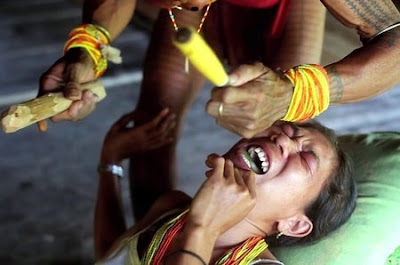Hello friends of Indonesian Culture, there is no end to talking about Indonesia. Where Indonesia is a country that is rich in diversity.
On this occasion, I will present a topic regarding Discovering Indonesia's Distinctive and Eerie Customs.
Indonesia, a country consisting of many islands, is home to a diverse range of tribes, ethnicities, and beliefs, each with their own unique traditions and customs that are still upheld today. These traditions are a source of pride for the Indonesian people.

According to Fatiharifah's book "100 Unique Traditions in Indonesia," there are several distinctive traditions throughout the country. Here are seven of them:
Bakar Tongkang from Riau Province
The Chinese community in Riau holds a barge burning ritual every June to express gratitude for their ancestors' success in bringing their families overseas. The barge represents the ship that brought their ancestors to Riau.
Bakar Batu from Papua Province
This tradition, practiced by various tribes in the interior of Papua, involves cooking with hot stones. The stones are heated until they are red hot, then placed in a hole with banana leaves and meat. This tradition is often used to show gratitude, celebrate important events such as weddings and births, and welcome guests.
Hombo Batu from Nias Islands
This tradition, only carried out by men in the Teluk Dalam area of Nias, involves jumping over a 2-meter-high and 60-90 cm wide rock. This tradition has been passed down from generation to generation and practiced for centuries.
Balimau Kasai from Riau Province
Balimau Kasai is a tradition from Riau where people bathe with water mixed with special oranges and use a fragrant substance called kasai to wash their hair. This tradition is believed to have originated from the Hindu purification ritual in the Ganges River, but it is still practiced today to welcome the month of Ramadan and express gratitude and joy.
Kerik Gigi from the Mentawai Tribe
Mentawai women sharpen or grind their teeth to achieve pointed teeth, which is a symbol of beauty in their culture. This tradition also aims to bring peace of mind, although the process can be painful. While this tradition is becoming less common, some women still practice it, particularly the wives of village leaders.
Tabot from Bengkulu Province
Tabot is a tradition from Bengkulu that commemorates the heroic story of Husein, the grandson of Rasulullah SAW who died in the Battle of Karbala. Originally started by Indian workers who settled in Bengkulu, this tradition has evolved to also fulfill the wishes of ancestors.
Timba Laor from Maluku Islands
The Timba Laor is a ritual that involves catching sea worms on Namalatu beach, Latuhalat Village, Ambon. These sea worms are high in protein and can be processed into traditional foods. This tradition has been practiced for hundreds of years and begins with a traditional ceremony before using fishing gear to catch the worms. The appearance of the laor is influenced by the cycles of the Moon and the Sun and can only be found during a specific time of year.

Post a Comment for "Discovering Indonesia's Distinctive and Eerie Customs"